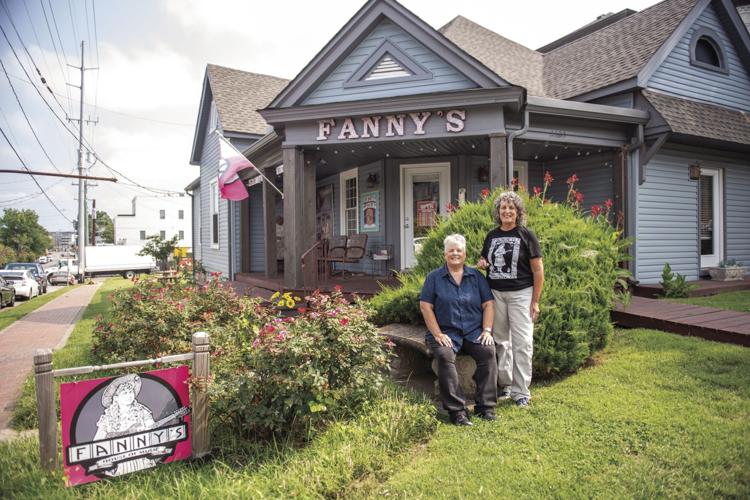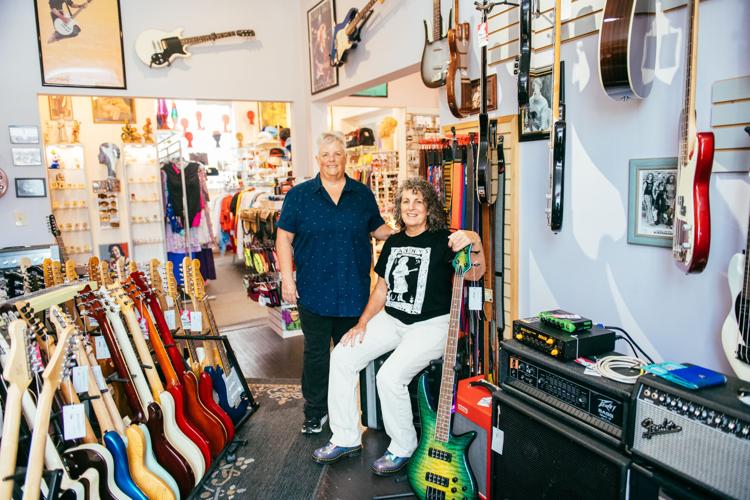
Pamela Cole (left) and Leigh Maples at Fanny's House of Music
A little blue house at the corner of South 11th and Holly streets in East Nashville’s Five Points neighborhood has ushered in people from all corners of Nashville since 2009. Under the watchful gaze of Sister Rosetta Tharpe, Mother Maybelle Carter, Joan Jett, Dolly Parton and other female musical luminaries who adorn its colorful mural, Fanny’s House of Music has provided an inclusive, welcoming space for all people to comfortably play music and learn its history, try new gear — more likely new-to-them, as Fanny’s is known for its well-curated stock of player-grade vintage instruments — and talk shop.
Business is bustling, and plans continue to expand the store’s footprint and launch the nonprofit Fanny’s School of Music, which will provide much-needed space for more educational and community-focused activities. Founders Pamela Cole and Leigh Maples met as students at Belmont University in 1982 — they were two of only a few female bass players at the school — and they already had decades of music-industry experience before opening Fanny’s. It’s the sort of environment they say they wish they’d had as children.
“We were talking one day about if someone would open a music store that was comfortable for everybody, especially women players,” says Cole. “And then the air sucked out of the car, and we went, ‘Oh crap. We’re supposed to be the ones to do it.’”
Maples has taken the past year-and-a-half off work due to migraines and nonterminal cognitive issues. After 15 years of running their beloved local business, she and Cole have identified their next step — retirement by the end of the year.
“We started Fanny’s together, and it’s been really hard to do it without her,” Cole says of Maples.
Both owners have worked to maintain the store’s legacy. Cole initially hoped that, with enough pledged funding, Fanny’s House of Music would be bought by the Fanny’s School nonprofit and become a social enterprise, a kind of for-profit business with an explicit focus on addressing community needs. As part of the revised plan, the search is underway for a buyer or buyers to purchase the property and the business from Cole and Maples.

Pamela Cole (left) and Leigh Maples at Fanny's House of Music
If the new owner of the land and the business are not the same person or group, the intention is to find a buyer for the property who will lease it back to Fanny’s House of Music for a seven- to 10-year term and facilitate the school’s development and the store’s evolution into a social enterprise. If this happens, Cole will act as a nonvoting member of the nonprofit’s board and watch over business practices. While the search will start mid-August, it’s crucial to preserve the environment that Cole and Maples have cultivated for a long time to come.
“People are going to be really upset if it ends,” Cole says. “It’s not about us. It’s about the mission. And the mission has always been empowering kids and women and having a place that was comfortable for all musicians.”
The shop’s name evokes Southern hospitality and nods to Fanny, the phenomenal all-woman rock band started by sisters June and Jean Millington in California in the 1960s. While everyone’s welcome in the shop, a key tenet of its mission is to celebrate female players and educate guests about the prominent and hidden figures behind music’s rich history.
“There are only women players on the walls, and I think all of them are actually holding an instrument,” says Cole. “That was important to me to have that representation, and not just [any] picture of the artist.”
Early in Taylor Swift’s career, Cole and Maples hung a poster-size print of her debut Rolling Stone cover in one of the lesson rooms. Cole notes that while she encountered many locals at the time who were dismissive of Swift’s musicianship, young students — boys and girls alike — responded strongly to the star’s confident gaze; some even hugged the poster. On a visit to the store, Swift signed it, dedicated to those kids.
The staff makes it a point to extend the same attentive customer service to everyone who comes in, celebrity or not. Swift is just one of many famous musicians who have visited and purchased instruments from Fanny’s, including Kacey Musgraves, Gracie Abrams, Jack White and Kathy Valentine. Brittany Howard was already on the wall at the store before she came in as a customer. She has since befriended Cole and Maples, and she now serves on the board of Fanny’s School of Music; Howard also filmed an interview for The 1619 Project, a Hulu docuseries exploring the history of slavery and its impact on modern America, at the store.
“I am very fortunate to have been born with a great deal of self-confidence — almost delusional — so I’m lucky that I feel pretty comfortable in a lot of places that I go,” says Ellen Angelico, who recently ended her 10-year tenure as a Fanny’s staffer to focus on her career as an in-demand session and touring guitarist. “But I know that people that look like me don’t always feel that way. So by taking care of those people, I’m kind of taking care of myself.”
Asked about her favorite instruments in the store, Cole calls on other staffers to refresh her memory, and Andrea Guess points her toward a 1956 Fender Musicmaster. Cole’s favorites always have interesting stories, and the Musicmaster has clearly been well-used and well-loved. The fretboard is darkened where a former owner (or owners) frequently placed their fingers; some of the tuning pegs have been replaced with pennies folded over, and a partial re-fret job has been carried out, with worn-out frets further up the neck simply left off. Gingerly, Cole picks up the oldest instrument in the shop, a parlor guitar dating from 1896.
“It’s called a ‘parlor,’ and they were to be played very quietly in the parlor, because women should be quiet and stay in the parlor,” Cole says, laughing. “And look at us now.”







